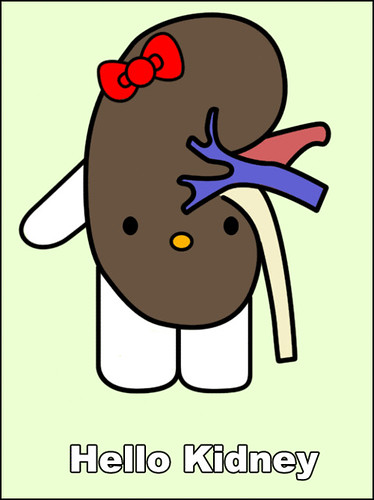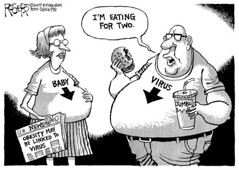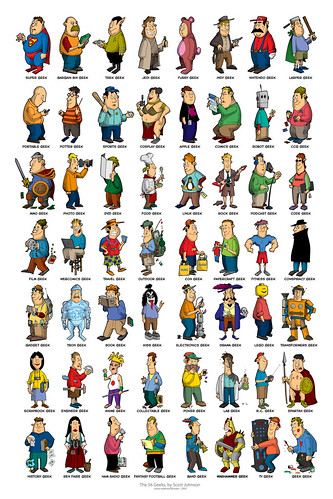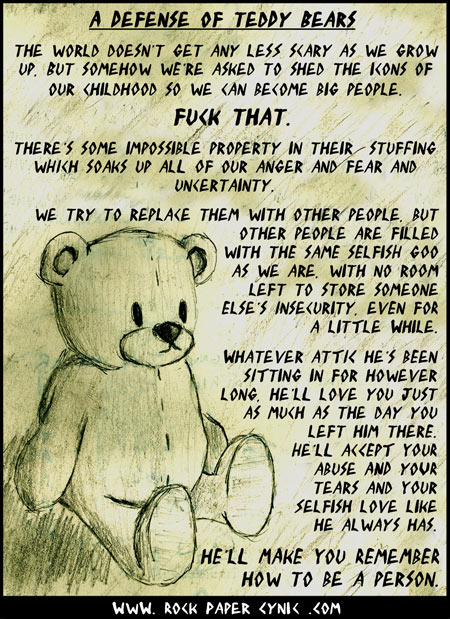Monday, March 30, 2009
Friday, March 27, 2009
How much is that kidney in the window? 4
 Dr Huang wants to know.
Dr Huang wants to know.
So does angry doc, actually.
Labels: HOTA, in the news, letters
Monday, March 23, 2009
Mahna Mahna
angry doc had liked this sketch for a long time, but it was only recently when he noticed how perfectly synchronised their movements were that he realised that the Snowths were played by a single performer (Frank Oz) .
Labels: video
Thursday, March 19, 2009
Vita Brevis
Some days life just feels like a never-ending series of auditions...
But you never give up.
Because you know it's the part you were born to play.
Wednesday, March 18, 2009
Labels: video
Friday, March 13, 2009
Can you catch obesity?
 Another letter to the ST Forum on the topic of 'catching cancer':
Another letter to the ST Forum on the topic of 'catching cancer':
Never say never, prof...
I REFER to Professor Mark Featherstone's letter on Tuesday, 'Catch Cancer? Not a chance'. Prof Featherstone exhorts us to show compassion to those who have had the misfortune to succumb to the scourge of cancer. No sensitive human being will debate this.
Yet, when he states quite unequivocally that the chance of contracting cancer from patients, either near or long term, is practically zero, he treads on controversial ground.
I cite two types of cancer to illustrate the contentiousness of his statement: liver cancer and stomach cancer. More than 90 per cent of liver cancers in Singapore are due to the hepatitis B virus, while the Helicobacter pylori bacteria are a cause of stomach cancer.
The hepatitis B virus can be spread by bodily secretions and Helicobacter pylori is spread by faeces. A lapse in standards of handling patients with these two cancers can cause health professionals and family members to be infected.
While it is true that most human cancers have so far not been linked to infectious agents, it may be wiser to accept this not so much as an inalienable truth than as a consequence of ignorance.
When I was in medical school in the 1970s, salted fish and preserved meats were regarded as the main causes of nose cancer among the Chinese originating from southern China; and consuming mouldy ground nuts and grains was seen as the main cause of liver cancer.
We now know that a viral agent is mainly responsible for most cases of these two cancers although factors like diet, stress or exercise may play pivotal roles as modifying or triggering factors. There have also been recent postulations that a condition like obesity, so intuitively linked to nothing more than a balance between diet and exercise, may actually be triggered off by an adenovirus.
One never says never when the more medical knowledge one discovers, the more astounded one feels about how impossibilities evolve into probabilities and subsequently into literally dead certainties.
So what if our loved ones are afflicted by agents which are infective? It should never affect our humane response to carry on loving and caring for them. We just need to modify our behaviour so as not to make our sympathies detrimental to our own health.
Dr Yik Keng Yeong
When Dr Yik was in medical school in the 1970s, it was not known that H. pylori caused gastric ulcers, let alone gastric cancer; yet today there is research using statistics and modeling to predict if screening for and treating the asymptomatic population (whether in general or at-risk groups) for H. pylori will reduce the incidence of gastric cancer - a cursory look at the abstracts of several papers suggests that it may.
How families and carers of patients will change their behaviour towards them when we learn more about the mode of transmission of H. pylori is still unknown, but the fear that cancer patients may be 'abandoned' by their family and carers should not blind us to the possibility that basic hygiene measures may in fact help reduce our chances of catching H. pylori.
+++
One interesting topic brought up by Dr Yik is that of the 'obesity virus', or adenovirus-36, which has been linked to the 'obesity epidemic'.
A recent paper in "Medical Hypotheses" tells us that:
"adenovirus-36 (Ad-36), is capable of inducing adiposity in experimentally infected chickens, mice and non-human primates (marmosets)."
(It is of course unethical to deliberately infect human subjects with Ad-36 to see if they 'catch' obesity.)
and that
"Recent studies have shown that, in the USA, antibodies to Ad-36 were more prevalent in obese subjects (30%) than in non-obese subjects (11%)."
Of course, it begs the question of why the 11% of non-obesed subjects are not obesed, or why the 70% of obesed subjects who are presumably not infected with Ad-36 are; nevertheless, if we are able to treat those 30% or prevent them from catching the virus to begin with, we might be able to reduce the incidence of obesity and the diseases which stem from it.
Screening for Ad-36 is not something that is done routinely (if at all) in weight-loss programmes locally, as far as angry doc is aware of. This probably has more to do with the fact that there is no known treatment for the infection and that there is no known vaccine against it than ignorance about the hypothesis.
Or are we just worried that people might get the idea that you can 'catch' obesity from fat people?
Labels: in the news, letters
Wednesday, March 11, 2009
Is cancer contagious?
Cancer is not a contagious disease
WE REFER to the article by Andy Ho last Saturday, "'Catch' cancer? Yes, you can". It highlights the role of infectious agents, particularly viruses in causing cancer, and suggests that since viruses are infectious, one might "catch" cancer from a cancer patient.
Viruses have been known to play a role in cancer causation since the Nobel Prize-winning discovery of the transforming activity of the rous sarcoma virus in chickens by Dr Peyton Rous nearly 100 years ago.
However, an infectious virus causing cancer is different from cancer being a contagious disease. In other words, healthy patients do not acquire cancer from another patient.
One of our patients mentioned this as a concern recently, and we feel it is important to point this out as cancer patients require the full support and care of their loved ones. It would be sad to see our patients with advanced cancer dying alone and or with relatives fearing to hold their hands or touch them. Some may even use such excuses to neglect or isolate their relatives with cancer.
Viruses are widespread and many people may have been exposed without symptoms. Hepatitis B carriers, for example, have an increased risk of liver cancer. Carriers could pass on hepatitis B as an infection, and all necessary precautions should be taken to minimise this.
However, only a minority of hepatitis B carriers develop liver cancer. These patients frequently acquired their infection many years ago at birth or during childhood. The liver cancer itself is not contagious.
It is estimated that 80 per cent to 90 per cent of the adult American population has been exposed to the virus mentioned in the article, Epstein-Barr virus (EBV), which is related to nasopharyngeal cancer (NPC) and lymphoma.
About 50 per cent of the world population has been exposed to the bacterium, helicobactor pylori, related to stomach cancer.
Overall, very few people who are exposed eventually develop these cancers.
Certainly, hand washing and other general hygiene measures are needed when we care for our loved ones with cancer, mainly to protect them from germs. However, we should not let that prevent us from touching and loving them.
Dr Peter Ang Cher Siang
Dr Tay Miah Hiang
Dr Leong Swan Swan
Oncocare Cancer Centre
Can cancer spread directly from one person to another? Not as far as we know.
But it is an undeniable fact that one can 'catch' an infection that increases one's chances of having certain types of cancer.
So is Andy Ho (and angry doc) justified in saying that you can 'catch' cancer? Well, that's a matter of opinion and semantics - angry doc thinks it's correct to say that one can catch cancer, but not so to say that cancer is contagious. Semantics.
But from a public health point of view angry doc thinks there is value in looking at certain types of cancers as 'infectious diseases'.
Recognition of the role of Human Papillomavirus in the pathogenesis of cervical cancer has allowed us to develop methods to screen for the cancer, and to develop a vaccine against the virus (and indirectly the cancer itself). No doubt recognition of the role H. pylori plays in the pathogenesis of gastric cancer will allow us to develop strategies to reduce its transmission, to screen for and treat asymptomatic 'carriers', and perhaps one day to develop an effective vaccine against the bacterium, all of which will indirectly reduce gastric cancer incidence.
If a man is diagnosed with liver cancer today, we screen the family for Hepatitis B. We do not yet (as far angry doc knows - do correct him if you know he is wrong) screen family members of patients with gastric cancer for H. pylori, although we know that theoretically if they are found positive and treated, their risk of developing gastric cancer will be reduced. Although angry doc is not directly involved in the field of research on H. pylori, a look at the amount of new research and information generated on the subject tells him that it must be an exciting time for those who are.
So yes, angry doc thinks that thinking of some forms of cancers as infections you can catch is useful.
But does that mean that we should be "careful with food or eating utensils of a loved one with cancer - to prevent transmission, if any, of his or her disease" as Andy Ho suggested?
Well, no.
Not yet anyway.
Labels: Clearthought, in the news, letters
Tuesday, March 10, 2009
Can you catch cancer?
Is the water safe to drink?
An article by Andy Ho in the Straits Times drew a rebuttal from a professor and lecturer in cancer biology in the ST Forum today, and fellow-Clearthought bloggers at Fresh Brainz and Vexillum II have written on the topic too.
For once, angry doc is inclined to disagree with the expert and his fellow-Clearthought bloggers - he thinks that Andy Ho's message that you *can* catch certain forms of cancer is basically correct.
As Ed has shown, sharing food with a patient with nasopharyngeal carcinoma is unlikely to increase your chances of having the cancer yourself significantly; but can that be said of all cancers where infection by a micro-organism plays a significant role in the pathogenesis?
angry doc is thinking specifically of Helicobacter pylori, a bacterium mentioned in passing in Andy Ho's article but not addressed by Professor Featherstone.
H. pylori is now known be "a strong risk factor for non-cardia gastric cancer" that in one study was found to have "increased risk for the disease nearly eight-fold".
Given the fact that H. pylori is an important risk factor for non-cardia gastric cancer, and that it is "thought to be spread either through contaminated food and water or through direct mouth-to-mouth contact", is it correct for Professor Featherstone to say that "there is not a single malignancy that can cause someone to 'catch' cancer in any meaningful use of the term"?
(What, for that matter, does "meaningful use of the term" 'catch' mean?)
Or is Andy Ho correct when he advised: "Don't be politically correct unto death"?
Well, is the water safe to drink?
Labels: Clearthought, in the news, letters
Monday, March 09, 2009
Handicap 2
Mr Joe Sim, CEO of National University Hospital, whose interview we discussed in a previous post, has written a clarification on his statement in a letter to the ST Forum tiday:
CEOs' handicap: NUH chief did not mean it that way
I REFER to Dr Chong Yeh Woei's letter on Friday, 'Medical training not a handicap for hospital CEOs'.
In my interview with The Straits Times, I was asked if being a non-doctor made the job any easier or more difficult. Among the many things I shared on this question was my belief that because I am not a doctor, it would be less likely that I would be perceived to be biased towards any medical department.
I did not intend this to imply that it is a handicap for a CEO to be a doctor or that doctors carry psychological baggage, as Dr Chong wrote.
In fact, I agree with Dr Chong that doctors and non-doctors can and do make good CEOs, and I also agree with his points about the qualities of a good CEO.
Indeed, effective health care requires close teamwork among doctors, nurses, and allied health and administrative staff, and the CEO needs to be able to harness the collective strengths of the whole team.
Joe Sim
CEO
National University Hospital
Poor, misunderstood Mr Sim.
He actually meant that he would not be "perceived" to be biased when he said:
'This way, I have no baggage when I make decisions as they are non-biased and this is good for the hospital and the system.'
So unlike what Dr Chong thought, Mr Sim was not implying that doctors would make decisions that are biased and bad "for the hospital and the system" because of their medical training; he's just worried that his staff might not be perceptive enough to tell if a decision made by their CEO was made with the interests of the hospital in mind or based on departmental bias, if he happened to be a doctor.
(Yes, one may believe in certain things, but there are certain things that one simply does not write in a letter to the Forum...)
Labels: in the news
Saturday, March 07, 2009
Friday, March 06, 2009
Handicap
angry doc missed this story when it came out in the papers last week, but it seems to have drawn the ire of another doctor:
Medical training not a handicap for hospital CEOs
I REFER to last Saturday's report, 'New NUH chief's focus: Lack of beds', in which the new CEO of National University Hospital, Mr Joe Sim, was quoted as saying: 'I find it easier not being medically trained. This way I have no baggage when I make decisions as they are non-biased and this is good for the hospital and the system.'
These words are disconcerting to me as a doctor. Mr Sim implies it is a handicap for a hospital CEO to be medically trained, and medical training would make one biased so decisions made by a doctor-CEO are bad for the hospital and the system.
There are many factors that are important in a good hospital CEO. A medical, nursing or allied health background does confer some advantage at the start because the time required to acquire health-care and hospital domain knowledge is less. I can agree that a hospital CEO does not have to be a doctor. But it is wrong to say that medical training leads to a biased hospital CEO.
What is important is not the CEO's background, but his personal attributes. There are several examples of doctors and non-doctors who have been both bad and good hospital CEOs. One obvious responsibility of any hospital CEO is doctor- engagement. For any hospital to flourish, a CEO must learn to engage doctors, and vice versa, in a honest, friendly and constructive way based on mutual respect and understanding. Labelling doctors as carrying psychological baggage is simply not the best way to start life as a hospital CEO.
Dr Chong Yeh Woei
Not having been a CEO of a hospital, angry doc cannot say for sure if being a doctor is an asset or a liability to the execution of one's duties as one. He suspects that, like Dr Chong stated, it is more an issue of one's personal attributes than one's past training.
(If one were to pick a CEO based on his or her training, angry doc would venture to suggest that the best person to run a hospital would be a nurse, since the business end of a hospital is actually the bed.)
Nevertheless, angry doc suspects that regardless of his or her past training, the job description of a CEO will require one to say things like:
"... my key priority for the next three years is to balance patients coming in from the emergency department and elective patients, ... We need a healthy proportion of electives in the face of an increasing emergency load. At the same time, we are under pressure to meet ER (emergency room) care."
which makes angry doc cringe more than:
"I find it easier not being medically trained. This way, I have no baggage when I make decisions as they are non-biased and this is good for the hospital and the system."
angry doc's point, however is not about who should run a hospital, or what a hospital should be run for, or even if Mr Sim will make a good CEO of a hospital - angry doc doesn't know Mr Sim personally, but according to the report the man has been in the healthcare business for about seven years and have been working in the hospital for more than two, so he presumably knows a thing or two about how things work - but about how something one said which at the time of utterance seemed innocuous enough to oneself can be made to make one look rather bad when the wrong emphasis is given by the media.
One may believe in certain things, but there are certain things that one simply does not say to the media.
That Mr Sim had not known that before he gave the interview is probably the only thing angry doc can fault him on.
Labels: in the news











